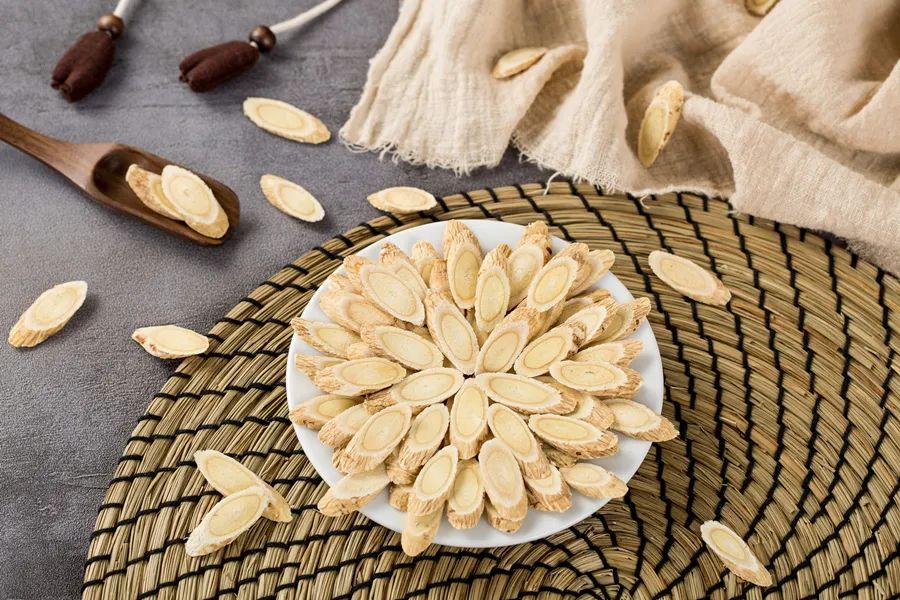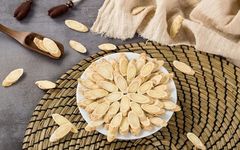 In daily life, symptoms of Qi deficiency are common, typically manifesting as fatigue, shortness of breath, low voice, and poor appetite with loose stools. For such individuals, the traditional Chinese herb Huang Qi (Astragalus) can be beneficial. Known in ancient times as Huang Qi, which means “the elder” in Chinese, it has been referred to by Li Shizhen as “the king of tonics”. Its yellow color corresponds to the Spleen, and it has been regarded as an excellent remedy for tonifying the Spleen and Qi since ancient times.
In daily life, symptoms of Qi deficiency are common, typically manifesting as fatigue, shortness of breath, low voice, and poor appetite with loose stools. For such individuals, the traditional Chinese herb Huang Qi (Astragalus) can be beneficial. Known in ancient times as Huang Qi, which means “the elder” in Chinese, it has been referred to by Li Shizhen as “the king of tonics”. Its yellow color corresponds to the Spleen, and it has been regarded as an excellent remedy for tonifying the Spleen and Qi since ancient times.
Effects of Huang Qi
Huang Qi is sweet and warm, entering the Spleen and Lung meridians. It has the following effects: tonifying Qi and strengthening the Spleen, lifting Yang and preventing prolapse, benefiting the Wei Qi and securing the exterior, promoting urination and reducing swelling, and expelling toxins to promote tissue regeneration.
▋Tonifying the Middle and Benefiting Qi
Huang Qi not only strengthens the Spleen and tonifies Qi but also benefits the Qi of the five Zang organs. When symptoms of Qi deficiency arise, Huang Qi can be used for regulation.
▋Lifting Yang and Preventing Prolapse
The Spleen governs the upward movement of Qi. If Spleen Qi is insufficient, it can lead to prolapse of internal organs, such as uterine prolapse, abnormal bleeding, and rectal prolapse. Huang Qi can replenish Qi, allowing Spleen Qi to rise normally and preventing prolapse.
▋Tonifying Qi and Benefiting Wei
Wei Qi protects the body’s surface. Huang Qi not only tonifies internal Qi but also enhances external immunity, making it useful for those who frequently catch colds.
▋Promoting Urination and Reducing Swelling
The medical sage Zhang Zhongjing mentioned in his work Jin Kui Yao Lue the use of Huang Qi to treat rheumatic edema. It is particularly effective for edema caused by Qi deficiency.
▋Expelling Toxins and Promoting Tissue Regeneration
If the body is deficient in Qi and blood, leading to non-healing sores or slow recovery from surgery, Huang Qi can be very effective.
Who Should Use Huang Qi?
1. Individuals with Qi deficiency, including many elderly people who experience asthma due to Qi deficiency (insufficient Heart Qi); those with poor appetite, abdominal distension, fatigue, and loose stools (Spleen and Stomach Qi deficiency); those who are timid and afraid to speak in public (Liver Qi deficiency); and those with kidney prolapse (Kidney Qi deficiency). 2. Those with spontaneous sweating, where slight movement leads to sweating, resulting in feelings of weakness and fatigue. This is often due to exterior deficiency and insufficient Wei Qi, which cannot secure sweat. Huang Qi can help tonify Qi to secure sweat. 3. Individuals with edema, where diuretic treatments for chronic edema often address only the symptoms. Chronic edema is not due to excess water in the body but rather an inability to utilize the water effectively due to insufficient Qi. Huang Qi can tonify the Qi of the Lung, Spleen, and Kidney, promoting fluid metabolism. 4. Those with constipation, particularly Qi deficiency constipation, where there is a sense of urgency but difficulty in passing stool, resulting in thin, noodle-like stools, often accompanied by sweating and shortness of breath after defecation.
Four Situations to Avoid Using Huang Qi
While Huang Qi is beneficial, it should be used with caution in the following situations: Avoid using it when experiencing heat symptoms: If there are clear signs of heat such as hoarseness or sore throat, do not consume Huang Qi water, as it may exacerbate the condition. Avoid using it in hot weather: Consuming it in hot weather can lead to heat symptoms such as nosebleeds. It is best to consume Huang Qi water in cooler weather, such as autumn and winter, for better effects. Avoid using it before bed: Generally, it is not recommended to drink Huang Qi water before sleeping, as it contains components that dilate blood vessels and promote circulation, which can affect sleep quality and increase nighttime urination. Avoid using it if you have high blood pressure: Scientific studies indicate that Huang Qi has a bidirectional effect on blood pressure, where low doses (below 15 grams) can raise blood pressure, while high doses (above 30 grams) can lower it. Regular doses used as a tea can raise blood pressure, potentially worsening the condition. Additionally, it is important to identify one’s constitution before using this herb. Generally, the following groups should avoid Huang Qi: those with Yin deficiency (manifesting as heat in the palms and soles, dry mouth and throat, irritability, and poor sleep quality); those with damp-heat (manifesting as dry mouth, bitter taste, foul breath, strong body odor, and thick greasy tongue coating); those with severe heat toxicity (manifesting as red face and eyes, local heat, high fever, short and red urination, and dry stools); individuals currently experiencing a cold or fever; and women during menstruation or pregnancy.
How to Consume Huang Qi
1. Huang Qi and Jujube Tea: 60 grams of Huang Qi and 30 grams of jujube, soaked in water for 1 hour, then boiled for 30 minutes. This can be consumed daily as a tea. The jujube can be eaten. This tea has the effects of tonifying Qi, lifting Yang, securing the exterior, stopping sweating, strengthening the Spleen, and nourishing blood. It is suitable for those with deficiency, pale complexion, dizziness, fatigue, shortness of breath, and spontaneous sweating. Huang Green Tea: 20 grams of Huang Qi and 3 grams of green tea. Brew with boiling water and drink when the temperature is suitable. It can be steeped up to 5 times. This helps improve nasal allergies and frequent colds. Huang Qi Qi Tea: 10 grams each of American ginseng, goji berries, and Huang Qi, boiled together for daily consumption. This tea nourishes Qi, nourishes Yin, clears heat, reduces fire, eliminates fatigue, and enhances immunity, suitable for those who often stay up late. 2. Congee for Tonifying Qi: 20 grams of roasted Huang Qi, 10 grams of Codonopsis, and 100 grams of japonica rice. Slice Huang Qi and Codonopsis, soak in water for 40 minutes, then boil to extract the essence. Wash the rice and cook it into congee, adding the essence of Huang Qi and Codonopsis just before it is done, and sweeten to taste. This recipe from Sheng Ji Zong Lu tonifies Qi, treats deficiency, and combats aging, suitable for those with internal injuries, fatigue, weakness, palpitations, shortness of breath, spontaneous sweating, chronic diarrhea, and poor appetite. Silver and Gold Congee: 50 grams of rice and 50 grams of millet, with 30 grams of Huang Qi wrapped in gauze and tied with cotton thread. Soak together for 30 minutes, then boil on high heat, reduce to low heat, and simmer for 30 minutes. Remove the Huang Qi bag before serving. This congee can improve digestive issues.
Complementary Formulas with Huang Qi
1. Huang Qi + Goji Berries for Effective Anti-Aging: Goji berries have adaptogenic properties similar to ginseng, can prevent arteriosclerosis, lower blood sugar, and promote liver cell regeneration. This combination enhances physical strength and delays aging. It can also improve sleep quality, as goji berries can be consumed year-round and help with sleep issues. It can also enhance memory, as goji berries, known as “wisdom fruit,” combined with Huang Qi can improve brain memory and learning ability, suitable for students and working professionals. 2. Huang Qi + Angelica: In TCM, Angelica is sweet, warm, and moistening, entering the Liver, Heart, and Spleen meridians. It has excellent effects on nourishing blood, activating blood circulation, regulating menstruation, and relieving pain. It can help with menstrual irregularities and dysmenorrhea, eliminating gynecological inflammation and normalizing menstrual cycles. It can also effectively inhibit arteriosclerosis and promote the growth of red blood cells. 3. Huang Qi + Honeysuckle: Honeysuckle is an excellent herb for clearing heat and detoxifying. It is sweet and cold, clears heat without harming the stomach, and has aromatic properties that dispel pathogens and eliminate dampness. This combination is effective for chronic kidney disease and can relieve skin itching.
▋Finally, what to do if Huang Qi causes heat?
Many people experience heat symptoms after consuming Huang Qi. Generally, this occurs due to excessive supplementation. Huang Qi is a strong Qi tonic, so it must be moderated. Typically, pairing Huang Qi with Angelica or Zhi Mu (Anemarrhena) can help mitigate heat symptoms. Since Huang Qi is warm in nature, consuming too much can lead to heat, and it can also be paired with cool herbs like American ginseng to achieve a balancing effect.

